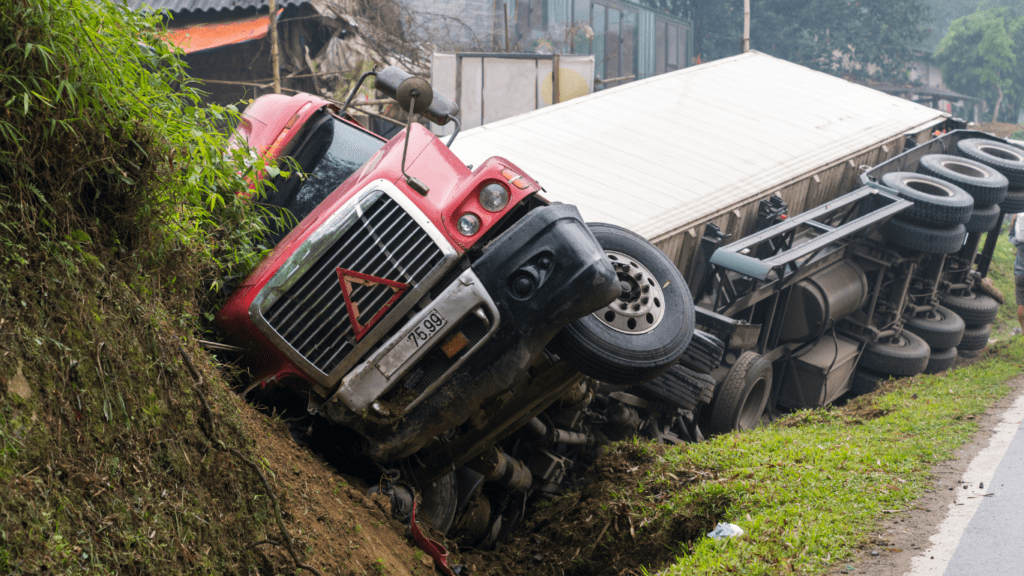A truck might jackknife for multiple reasons, including adverse weather conditions and stopping suddenly. For truck drivers, jackknifing can be terrifying and deadly. In this post, we’ll share more details on what a jackknife accident is, how truck drivers can reduce the risk of jackknifing, and what to do if you’re involved in a truck accident.

What Is a Jackknife Truck?
A jackknife occurs when a truck’s trailer skids and folds back toward the cab. Visually, it’s similar to a folding pocket knife. Jackknifing can lead to severe consequences, including rollovers. A jackknife truck poses a significant risk to the truck driver and other California motorists. It’s not uncommon for truck accidents involving a jackknife to entail many vehicles. Understanding what causes a truck to jackknife and how to prevent it is crucial for every truck driver, whether you’re experienced or new to the road.
Common Causes of Jackknife Truck Accidents
Jackknifing typically starts with a truck losing traction, often with the trailer’s wheels. Several factors can trigger this loss of traction, including sudden braking or slippery roads. The truck cab slows down, but the momentum causes the trailer to swing around toward the cab. Conditions like wet or icy roads can cause a trailer to skid uncontrollably.
What Causes Trucks to Jackknife?
Articulated vehicles like tractor-trailers are susceptible to jackknifing, a dangerous fold towards the cab, under conditions like excessive speed, worn brakes, and driver fatigue.
What triggers trailer swings in large trucks?
Trailer swing, when a truck’s rear swings dramatically towards the cab, often occurs due to loss of traction triggered by factors like sudden braking, slick roads, or uneven weight distribution.
Other causes include equipment failure, especially with a truck’s braking system. The brakes may lock up on one side of the trailer but not the other, causing an imbalance. The truck’s cargo load can also impact a truck’s risk of jackknifing. A truck with improperly loaded or unsecured cargo can shift during transit. That leads to instability and the increasing risk of a jackknife.
Driver error is also a leading cause of truck accidents, including jackknifes. Drivers who excessively speed, make abrupt maneuvers, or fail to adjust their driving style to current weather conditions can also lose control and cause a jackknife accident.
If you or someone you know experienced a jackknife accident, contact a professional Sacramento truck accident lawyer to help you win your case!
Tips for Preventing a Jackknife Accident
Preventing a potential jackknife is primarily about being prepared. Truck drivers must verify the truck is regularly maintained and undergoes all its safety checks. Defective brakes and malfunctioning mechanical systems can lead to any accident, not just jackknifed.
Truck drivers need to adapt to road conditions and factor in weather. For example, gradual and slow braking is necessary on slippery roads. Ensure you’re making steady and slow turns, especially on icy roads. Careful maneuvers can reduce the risk of a trailer losing traction and swinging around. Watching your speed is also crucial because conditions might make driving below the posted speed limit essential.
Properly loading and securing cargo cannot be overstated. An unevenly loaded trailer is significantly more susceptible to jackknifing, as the imbalance affects the vehicle’s stability. Drivers aren’t typically loading and unloading cargo; therefore, they must guarantee the completion of all safety checks before getting on the road.
Maintaining safe speeds, properly loaded cargo, and regular vehicle maintenance can significantly reduce the risk of loss of control and jackknifing in large trucks. Understanding trailer dynamics and practicing defensive driving techniques are crucial for truck drivers to mitigate instability and prevent dangerous situations. While impossible to eliminate entirely, advanced braking systems and improved trailer designs are continuously being developed to further enhance stability and prevent jackknifing in semi-trucks.
What to Do in the Event of a Jackknife Accident?
Knowing what to do next is essential in the unfortunate event of a jackknife accident. The first step is to stay calm and ensure everyone is safe. Next, call 911 to alert emergency personnel of an injury accident involving an 18-wheeler truck. If you can do so safely, take photos of the accident scene, including vehicle damage, skid marks, debris, and other factors that may have contributed to the accident. All parties should avoid discussing fault at the accident scene and allow the officer to make their observations. If the other driver is at fault, the claims adjuster could use anything you say against you during the liability investigation. California is a comparative negligence state, which means the adjuster will try to pin as much liability on you as possible. That’s because your percentage of fault reduces the amount of your compensation. For example, 30% liability means you can only recover a maximum of 70% of your damages.
Should You Hire a Truck Accident Attorney?
You should meet with a California truck accident lawyer if you suffered injuries and believe you are not at fault for the collision. Hire an experienced lawyer at GJEL Accident Attorneys to protect your rights. Insurance adjusters are prohibited from speaking to someone who has an attorney representing them. That means your attorney will also handle all potential settlement negotiations on your behalf. If we cannot reach an agreement, we are fully prepared to file a lawsuit.
Contact GJEL Accident Attorneys Today
If you need assistance pursuing compensation for a jackknife accident, let the experienced team at GJEL Accident Attorneys help. We offer free, no-obligation initial consultations and only charge fees once we recover compensation. Let us use our years of litigation experience to work for and fight for you. We serve all of California from the South Bay to the North Bay. Contact one of our offices today for a free case review.
